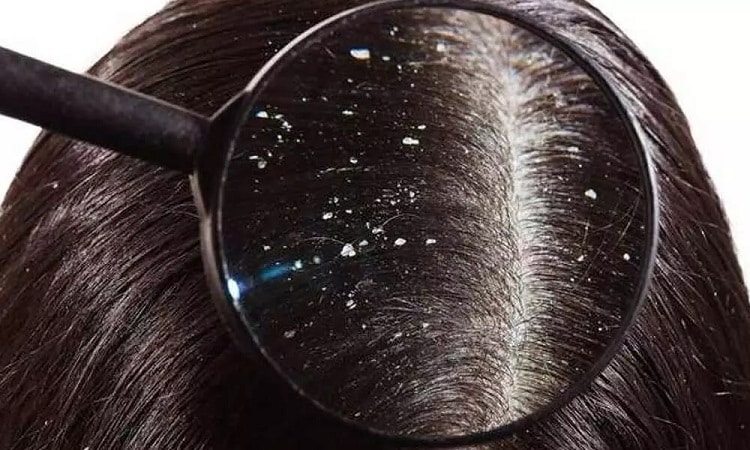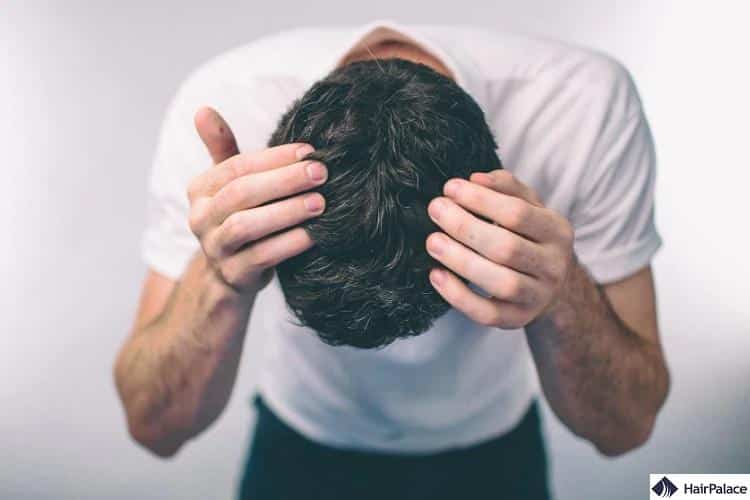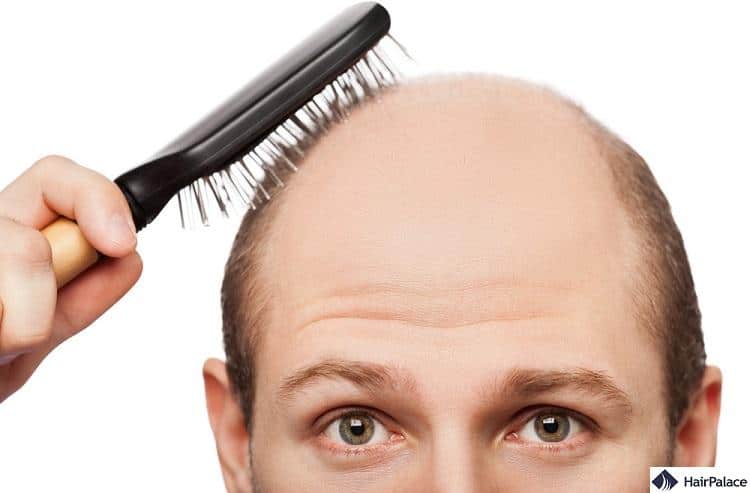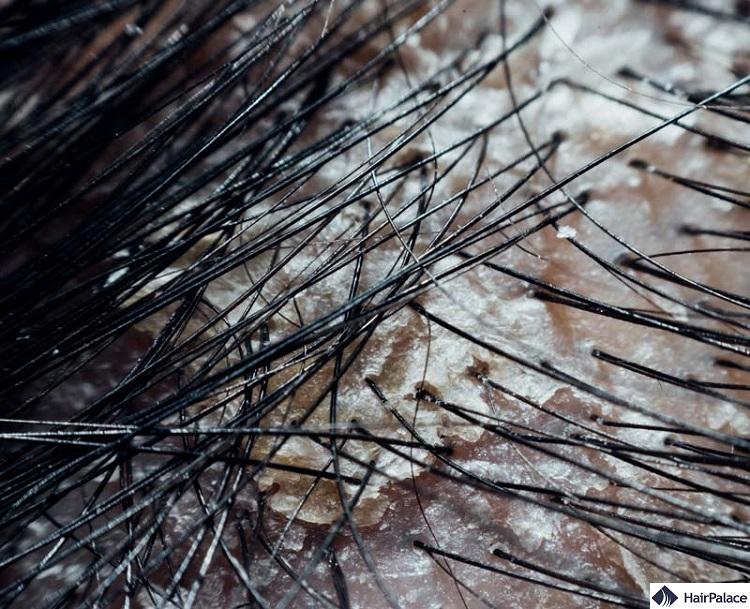Does Dandruff Cause Hair Loss? Expert Prevention Tips in 2025

Dandruff is one of the most common hair conditions worldwide.
Not only can it be embarrassing to experience, but dandruff can be highly irritating to the skin and cause itchiness and inflammation across your scalp.
Dandruff itself does not directly cause hair loss.
However, the itching associated with dandruff can lead to scratching, which may damage hair follicles and result in temporary hair shedding.
Chronic inflammation from severe dandruff conditions like seborrheic dermatitis can also weaken hair follicles and contribute to hair loss.
Today we’ll investigate the root causes of dandruff and share expert tips and advice on how best to manage your symptoms, ensuring you prevent future outbreaks from occurring.
- What causes dandruff?
- Can dandruff cause hair loss?
- Other causes of hair loss
- Prevention tips
- 4 Treatment options
- Conclusion
What causes dandruff?
Put simply, dandruff is caused by an overgrowth of the fungus Malassezia, which causes nearby skin to become inflamed and produce excess skin cells.
This excess quickly sheds and becomes small, white or yellow flakes.
Commonly known as seborrheic dermatitis, dandruff results in an itchy scalp that many patients scratch for relief. This unfortunately can cause significant damage to hair follicles.
So what causes this sudden overgrowth of Malassezia?

There are many factors to consider. One of the most common factors that contribute to dandruff is dry skin.
When your scalp lacks natural oils and lubricates, the skin becomes irritated, causing flakes to appear.
Another contributing factor can be a reaction from harsh products, especially if you already have sensitive skin.
Certain shampoos, conditioners, sprays, and chemical treatments may contain ingredients too potent for your skin to handle.
Instead, opt for a hair dandruff shampoo that can nurture and nourish your hair and help reduce irritation.
Sometimes, patients notice dandruff after washing hair, in these cases, the condition may be caused by poor scalp health.
You might not wash your wash often enough or allow your shampoo and conditioner to set in hair long enough before rinsing out.
Follow their instructions rigidly to improve your scalp’s conditions.
Finally, underlying skin conditions, like scalp psoriasis and eczema, and hair loss conditions, like male pattern baldness, can also increase the likelihood of developing dandruff.
You may already have flaky skin, and flakes appear more frequently throughout your hair.
Can dandruff cause hair loss?

Dandruff on its own is not directly linked to hair loss.
That said, depending on how you treat and react to it, it can contribute to temporary hair loss and receding hairline.
Because dandruff causes intense scalp itchiness and irritation, a common reaction from most people is to scratch, comb, and pull at the affected areas.
These increased physical interactions can indirectly cause massive damage to already vulnerable hair follicles, disrupting the natural hair growth cycle and leading to premature hair fall.
For this reason, taking dandruff seriously is crucial, especially for children who may tend to scratch and scratch their heads for relief.
Switch to gentle, anti-dandruff haircare products to soothe and support your scalp during this difficult time.
Sometimes, dandruff can be persistent and survive medicated shampoos and hair products.
Read on to learn about the potential causes of this condition and to find the best hair dandruff treatment.
Other Possible Causes of Hair Loss

While dandruff hair loss may be considered rare, dandruff itself can be a warning sign.
Remember, dandruff only presents itself when your scalp is suffering.
Dandruff can cause significant problems and become much more detrimental if left untreated.
Below are some conditions which are linked to both dandruff and hair loss:
- Fungal infections: If you are suffering from intense itching, dry flakes, and blisters, alongside significant hairless, you may have contracted a fungal disease like ringworm or tinea capitis. Treating your hair with an anti-fungal shampoo can help resolve the issue.
- Scalp psoriasis: As an autoimmune disease, this is when your body’s immune system mistakenly attacks healthy cells in your body. This results in thick, scaly skin patches developing across your scalp, which become incredibly itchy and irritating to the surrounding skin.
- Folliculitis decalvans: This is a rare, chronic hair loss condition that often disguises itself as dandruff in the early stages of development. The condition causes your scalp to become inflamed so that follicles become permanently damaged, and scarring occurs.
- Lichen planopilaris: This condition can permanently destroy hair follicles, replacing them with scarring. Early symptoms include scalp redness and rashes that look pretty similar to dandruff. Lichen planopilaris can also affect eyebrow and body hair and primarily affects more women than men.
- Seborrheic dermatitis Stubborn dandruff is one of the main symptoms of this condition. You should also be wary of greasy scales developing across your scalp, white or yellow flakes, and inflamed skin. Causes can include hormone imbalances, stress, and genetics.
- Other conditions: Straight or curly hair dandruff can appear alongside another hair or skin condition, such as male and female pattern baldness.
How to prevent dandruff-related hair loss

Whether it’s your first time experiencing dandruff or you’re suffering from a sudden flare-up again, there are various things you can do to support your hair and prevent any future hair loss.
Consider the following advice:
- Diagnosis: If dandruff lasts more than a week or you’re suffering repeated outbreaks, you should seek medical advice from your doctor or dermatologist. They can help identify the root cause of dandruff and put you on a tailored treatment plan.
- Hair loss: Significant hair loss combined with dandruff indicates an underlying condition may be at play. Seek medical advice to eliminate other health issues.
- Hairstyles: Certain hairstyles can add unnecessary pressure to your hair, making dandruff more noticeable and weakening the stability of strands. Avoid tight styles in particular, such as braids, cornrows, and tight ponytails.
- Treatments: Avoid using a hair dye or perm treatment, as these can further irritate your scalp. Furthermore, avoid using heat-styling devices like hair straighteners, curling irons, or hair dryers, as these can severely dehydrate your hair.
- Hygiene: Wash your hair more regularly to ensure it remains dirt free. Finally, ensure you follow the instructions for anti-dandruff shampoos and conditioners carefully. Some brands may require extra time to set in hair before rinsing or be used more frequently to yield results.
4 ways you can treat dandruff
While prevention is the best defence against dandruff, there may be a time when it appears on your scalp. The most important thing is not to worry.
There are many different effective ways to treat the problem.
Below are four options to always keep in mind if you struggle with dandruff and hair loss:
1. Use anti-dandruff shampoo with specialized ingredients
One of the best ways of treating dandruff is ensuring that your hair and scalp are adequately moisturized.
You can achieve this by increasing the number of times you wash your hair, or perhaps using a hair oil for dandruff.
Don’t rely on generic shampoos; opt for specialized anti-dandruff hair products with anti-fungal ingredients, such as salicylic acid, selenium sulfide, ketoconazole, coal tar, coconut oil, or zinc pyrithione,
These can help protect and cleanse your hair.
Remember to follow instructions carefully – leave the shampoo in for at least 5 minutes before rinsing.
2. Concentrate on a small number of products
Over-treating your hair with several sprays, mousses, gels, and shampoos can overload your scalp, lead to irritation and itchiness, and contribute to your dandruff problems.
For this reason, we advise limiting your hair care products to the bare essentials until your dandruff is under control.
Reintroduce products individually to see which ones are causing your scalp issues.
3. Reduce stress levels
While stress alone will not cause dandruff, it can aggravate its severity.
When stressed, your body produces more cortisol, which can further inflame your skin and irritate your scalp.
You can reduce your stress levels by practising relaxation techniques daily, such as yoga, breathing exercises, mindfulness, walking, and improving your sleep quality.
4. Visit a doctor
Dandruff can indicate an underlying condition, like dry skin, psoriasis, or eczema, or make excessive hair loss from conditions like androgenic alopecia even worse.
If you’ve tried our previous suggestions, and the dandruff is still persistent, or you’re experiencing frequent flare-ups, you should visit your doctor for a check-up as soon as possible.
Summary
In most cases, mild dandruff is an easy-to-manage condition that people can treat relatively quickly with simple home remedies and over-the-counter shampoos.
But as this article has shown, several severe hair loss conditions can easily be mistaken for dandruff – so taking it seriously is essential.
While dandruff alone will not cause hair loss, you should avoid scratching and pulling at these itchy flakes, as this can cause severe damage to hair follicles and lead to premature hair shedding.
Using a combination of anti-dandruff shampoos, reducing stress levels, and improving your hair hygiene can often help alleviate even the most troublesome of dandruff flare-ups.
If your dandruff persists for a few weeks, and you find it impossible to ignore the itchiness, visit your doctor or dermatologist as soon as possible for a formal diagnosis.
Dandruff Hair Loss FAQ
Dandruff is primarily caused by a yeast-like fungus called Malassezia, which exists naturally on the scalp. This fungus can irritate the scalp and lead to increased skin cell production, resulting in the shedding of dead skin cells as visible flakes. Other contributing factors include dry skin, sensitivity to hair care products, and skin conditions such as eczema or psoriasis.
To remove dandruff, use an anti-dandruff shampoo containing active ingredients like ketoconazole, zinc pyrithione, selenium sulfide, or salicylic acid. Follow the instructions on the product for the best results, ensuring you massage the shampoo into your scalp and leave it on for the recommended time before rinsing thoroughly. Regular washing with these shampoos can help reduce flakiness and scalp irritation.
To control hair loss due to dandruff, regularly use anti-dandruff shampoos containing ingredients like ketoconazole or zinc pyrithione to reduce scalp inflammation and flakiness. Additionally, maintain a healthy scalp by avoiding harsh hair products, reducing stress, and following a balanced diet rich in vitamins and minerals to support hair health.
Last medically reviewed on January 2nd, 2025
- Chiu CH, Huang SH, Wang HM. A Review: Hair Health, Concerns of Shampoo Ingredients and Scalp Nourishing Treatments. Curr Pharm Biotechnol. 2015;16(12):1045-52. doi: 10.2174/1389201016666150817094447. PMID: 26278532.https://pubmed.ncbi.nlm.nih.gov/26278532/
- Borda LJ, Wikramanayake TC. Seborrheic Dermatitis and Dandruff: A Comprehensive Review. J Clin Investig Dermatol. 2015 Dec;3(2):10.13188/2373-1044.1000019. doi: 10.13188/2373-1044.1000019. Epub 2015 Dec 15. PMID: 27148560; PMCID: PMC4852869.https://pubmed.ncbi.nlm.nih.gov/27148560/
- Kumari KMU, Yadav NP, Luqman S. Promising Essential Oils/Plant Extracts in the Prevention and Treatment of Dandruff Pathogenesis. Curr Top Med Chem. 2022;22(13):1104-1133. doi: 10.2174/1568026622666220531120226. PMID: 35642120.https://pubmed.ncbi.nlm.nih.gov/35642120/
- Jain S, Arora P, Nainwal LM. Essential Oils as Potential Source of Anti-dandruff Agents: A Review. Comb Chem High Throughput Screen. 2022 Jul 27;25(9):1411-1426. doi: 10.2174/1386207324666210712094148. PMID: 34254910.https://pubmed.ncbi.nlm.nih.gov/34254910/
- Meray Y, Gençalp D, Güran M. Putting It All Together to Understand the Role of Malassezia spp. in Dandruff Etiology. Mycopathologia. 2018 Dec;183(6):893-903. doi: 10.1007/s11046-018-0283-4. Epub 2018 Jun 26. PMID: 29946996.https://pubmed.ncbi.nlm.nih.gov/29946996/


